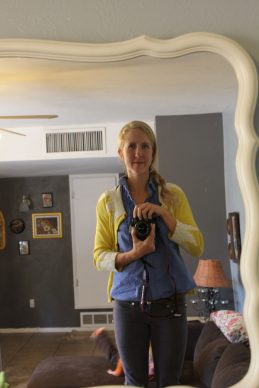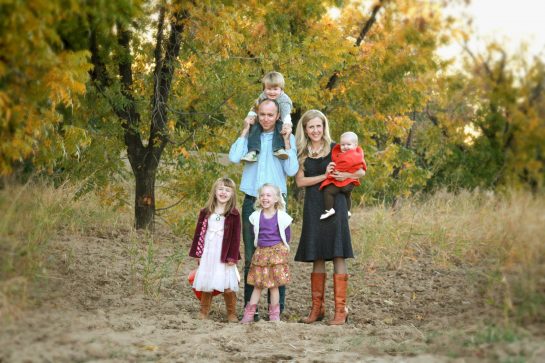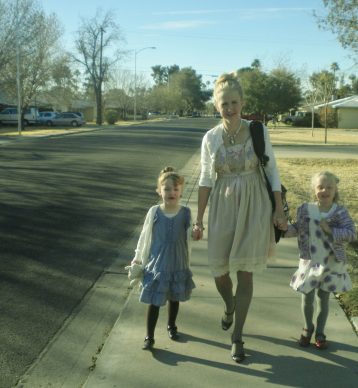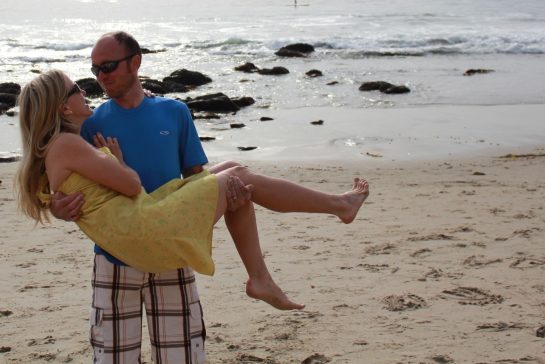At 15, Beth lost a few pounds at camp and came home to increased attention and concern. Liking that attention, her mind was overtaken by anorexia. In college, her disorder evolved into bulimia. Seeing an eating disorder therapist allowed her to get pregnant, and Beth is now heading up the first Anorexic/Bulimic Recovery Program in the church.
Can you describe the development of your eating disorder?
My eating disorder began when I was 15 years old, the summer after my sophomore year in high school. I had unintentionally lost about 5 lbs when I went to girls camp. I came home, and thought, “That was kind of nice. That wasn’t too hard to lose 5 lbs. I wonder if I can lose more.” Those thoughts were the starting point of it all. I was never big to begin with. I’m naturally a slim person and didn’t need to lose any weight, so when I started losing more weight it was pretty drastic. People noticed really quickly–I was getting compliments or even concern, and I liked that. The attention fed the disorder.

The disorder started off as Anorexia. I rarely ever skipped a meal, but always ate very small portions, and I over-exercised. Right before I was a senior in high school, my parents became really concerned because I was so thin and my periods stopped. I would get sick all of the time, and my personality changed. Before the disorder, I liked to be social, I laughed easily, and I was fairly happy. The eating disorder took that away from me. I wasn’t social anymore. I was kind of depressed and just consumed by this obsession with food. My parents tried to intervene, but they didn’t really know what to do. I was taking horseback riding lessons at the time which was one of the most important things in my life. My mom sat down and said that she was going to stop the horseback riding lessons if I didn’t start eating more. She had me eat a bowl of Dinty Moore Beef Stew and a very big glass of milk. Bless her heart, she was doing what she thought was best. When I knew I had to eat to keep the horseback riding lessons, I tried to find a way to get rid of the food. That was the point when I went from being Anorexic to Bulimic.
I struggled with Bulimia all through college. I tried making myself throw up but I wasn’t able to so I ended up using laxatives in a binge and purge cycle. I would be really strict about what I ate, and I would exercise a lot. I would eventually get really hungry, of course, and I would binge. When I binged, I would feel really badly about myself, and then I would use the laxatives. It was a cycle I thought I would never be free of. Bulimia was a lot harder to deal with mentally than the Anorexia because of the feelings of guilt and shame that I experienced. I felt ashamed because I believed I should be able to control what I was eating. I felt like a pig. I thought, “You’re disgusting. Why would you eat so much? You should be able to control that.” Sometimes I thought, “Why is this so important to me? Am I just really vain?” I didn’t like worrying about my weight all of the time. I knew it wasn’t important, but I couldn’t help thinking about it, and I knew that Heavenly Father didn’t want me obsessing over it, but for some reason I couldn’t get away. The really hard thing about eating disorders is that you have to eat. You can’t separate yourself from food. You can separate yourself from drugs and alcohol and pornography and gambling but you have to eat. Every meal time you have to face it again. I didn’t want to live like that. I got to the point where I just wanted to die. I wanted to have a car hit me because I was feeling so badly about myself.
During my junior year in college, I was studying my scriptures one night, and I started reading Mosiah 7:18-19. I read, “Oh ye, my people, lift up your head and be comforted; for behold, the time is at hand, or is not far distant, when we shall no longer be in subjection to our enemies, not withstanding our many strugglings, which have been in vain; yet I trust there remaineth an effectual struggle to be made.” That scripture felt like it was written for me. It helped me realize that I could get through this. I just needed to have hope. It felt like Heavenly Father was saying to me, “It might be a little while, but you will get through this. You will be able to be whole again.” It was very calming. I felt okay with having to struggle a little longer knowing there was an end in sight.
How has your eating disorder affected your relationships?
I met my husband around this time, and dating him seemed to help alleviate my symptoms for a little while. Unfortunately, this wasn’t permanent. When I finally talked to him about my eating disorder, he didn’t know what to do. I don’t blame him. He didn’t understand. He made us dinner one night when we had only been married for a short time. I didn’t want to eat it for one reason or another, and he got really upset with me. He said, “Why won’t you just sit down and eat with me?” I thought, “I don’t want to be like this. I want to be able to sit down and enjoy a meal with my husband without worrying about the calories or if it’s going to make me gain weight or feel guilty.” At that point I decided I was going to do something about my disorder beyond trying to fix it myself. I found an eating disorder therapist on the Internet and made an appointment. My husband and I talked about it–it was expensive and wasn’t covered by our insurance but we decided that it would be worth it because I wanted to be happy. If you’re not happy then what’s the point? The therapist had had an eating disorder herself and had recovered from it. She became a therapist because she wanted to help others in her situation. She helped me so much; she was the first person I could open up to, and I felt completely safe telling her everything. Going to see her helped me realize that eating disorders are not about weight. The disorder might start off as a weight issue but there’s always an underlying problem, whether it be self-esteem, relationships with family and friends, etc. Once we got to the root of that, I could start healing.

What do you think was the underlying root of your eating disorder?
A lot of factors went into my eating disorder. It started off as a weight issue and morphed into more of a control issue. I really liked being in control of every little thing that I ate. The more I could control it, the worse it would get. Growing up I didn’t have the best self-esteem or body image either so that definitely factored into it. I’ve always been quiet and shy and get a bit nervous in social situations–sometimes more than others. I think that at school especially I didn’t really feel like I fit in or that I was ever good enough. I felt like I was just kind of a tag-a-long sometimes and that no one really noticed me, or that people only wanted to be around me when they needed something from me. When I started losing weight and getting attention and compliments it filled that insecure spot and made me want to lose more weight. I realize now that it wasn’t as bad as I had imagined. I was just shy–it was my insecurities and Satan telling me I wasn’t good enough.
How has your eating disorder affected motherhood?
What’s interesting is that it wasn’t until I went to an eating disorder therapist to deal with the anxiety and depression surrounding my disorder that I was able to get pregnant. We had been married for more than a year and had used very little to no birth control, and I had never been able to get pregnant. It wasn’t because I was too thin, because at that point I was at a healthy weight and having my periods. It was the anxiety and stress I experienced in dealing with the eating disorder that was keeping me from getting pregnant. I was also nervous about getting pregnant. I was nervous about the changes it would bring and obviously the weight gain. At the same time I always wanted to have a family and to have children. My desire for a family won out over the body issues, luckily.
I have four small children now, three of whom are girls. Having daughters has taught me a lot. When I was younger I would think, “Well, this is about me. This isn’t hurting anyone else.” But that’s not true. It hurts everyone who loves you and it hurts people who look up to you, families and friends. I don’t want my children to hear me say negative things about my body or my looks. I’m very diligent about it because I don’t want them to have to go through what I did. I’m trying to do all that I can. I do tell them that they’re beautiful but I also try to compliment them on things deeper than physical beauty. I try to tell them that they are smart and brave and strong and kind. I want them to know that their worth is more than their physical beauty.

Can you talk about the church’s new Anorexic/Bulimic Recovery Program?
I’m heading up the first Anorexic/Bulimic Recovery Program the church has ever organized. It’s very exciting. It’s really nice that the church is recognizing this as a problem. I think a lot of women in our society struggle with self-esteem, especially women in the church, because they strive for this perfect ideal. This manifests itself in many ways, including the way that women view their bodies and compare themselves to others. I’m always surprised when I meet a woman who hasn’t struggled with her body image, even slightly.
The Anorexic/Bulimic Recovery Program tries to help these women who are struggling; it is a 12 step program with a group leader (someone who has gone through full recovery) and a facilitator (someone who is still struggling with the problem but they’ve gotten to a point where they’re functioning so they can help when needed). I am the group leader in my ward’s program and recently went to my first meeting. We went around the room and gave everyone a chance to talk. If someone wanted to share they could. If they didn’t want to share, they could pass and just listen. Everything that was said in the room stayed in the room so it was all very confidential. All of the girls shared, and it was really touching. I felt humbled and grateful to be a part of it. It was therapeutic and brought a lot of feelings back that I hadn’t felt for a while. What I took away most from the meeting was just how important it is to not let those feelings of insecurity and inferiority sneak back into my life. It’s okay to not be perfect. It’s okay just to do my best. I have to work at it every day.
Do you feel like you’re completely cured from your eating disorder?
I strongly believe that there will always be that eating disorder in my head, but as long as it doesn’t take up more than a few seconds of my day or more than a small fraction of my mind, then I’m okay. I just have to be careful. I have to be aware of triggers. I have to refrain from obsessing over things. I have to be close to the Lord, and I have to read my scriptures so that I can have the Spirit with me; this makes me stronger and more able to pick out what’s important and what’s not. I feel like I’m in a really good spot. I feel really blessed to have gotten here because at times I felt like I never would.

Strangely enough, I wouldn’t change the events in my life at all. Even the hard times. I went through them for a reason, and I am the person I am today because of them. I have learned empathy. I have learned that I am strong and can do hard things. I have learned that trials are here for a reason. I am going to do all that I can to help others, to take what I have learned and share my story so that they can know that there is hope and eating disorders are not impossible to overcome. I never thought I would break the cycle–a cycle filled with self loathing and depression, but I did! If you would have told me 10 years ago that I would be a group leader in an eating disorders support group I would have never believed you! I also know that if we live in a way that invites the Spirit to be with us, we can overcome all things. Even when we think we can’t. We can. We are worth more than we can imagine. And that worth doesn’t lie in a number on a scale or a waist measurement. It lies in the goodness of our hearts and being brave enough to stand up for what is true.
At A Glance
Beth Ann Allen
 Location: Mesa, AZ
Location: Mesa, AZ
Age: 29
Marital status: married to Jared Allen for 9 years
Children: Ella-7, Rory-6, Hudson-3, Violet-1
Occupation: mother, artist
Schools Attended: Mesa High School, ASU
Languages Spoken at Home: English
Favorite Hymn: “For The Beauty of the Earth”
On The Web: www.ellaandrory.blogspot.com
Interview by Krisanne Hastings. Photos used by permission.
At A Glance
